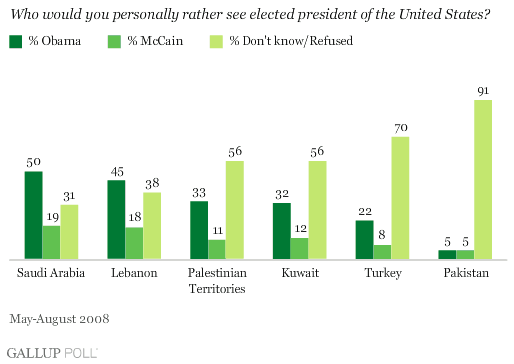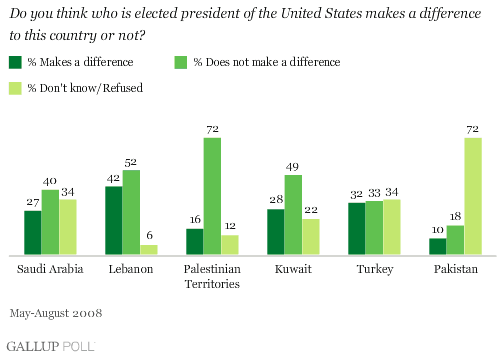BEIRUT, Lebanon -- Gallup Polls conducted in May-August 2008 in six predominantly Muslim countries show that public interest in who wins the U.S. presidential election ranges from comparatively high in Saudi Arabia and Lebanon to very low in Pakistan. Those who do express a preference tend to prefer Democratic candidate Barack Obama to Republican candidate John McCain by margins of at least 2-to-1.

Attributable to the historic nature of the 2008 U.S. presidential race and presumed foreign policy differences between Obama and McCain, the conventional wisdom is that the race has generated unprecedented levels of interest worldwide. Yet only in Saudi Arabia and Lebanon do majorities of those Gallup polled voice a preference for a presidential candidate. In Saudi Arabia, more than two-thirds of those polled do so, with 50% preferring Obama versus 19% for McCain. This is similar to Lebanon, where 45% favor Obama versus 18% for McCain.
Fewer than half of Palestinians and Kuwaitis voice a preference for Obama or McCain, however, as do just 30% of Turks. In each of these countries, the margin of preference for Obama among those who do state a preference is about 3-to-1. Among Palestinians, where 33% favor Obama compared to 11% for McCain, the bulk of those who offer an opinion live in the West Bank and East Jerusalem, with few Gaza residents stating a preference.
Interestingly, the 10% of Pakistanis who express an opinion about the election are evenly split in their preferences between Obama and McCain. Pakistanis' disinterest is noteworthy considering the high-profile nature of Pakistan's relationship with the United States.
The Obama Factor
In each of the six countries surveyed a majority of those who do say the winner of the U.S. presidential election makes a difference to their country favor Obama. There is little evidence that people in the Muslim world view Obama in the context of his father's religious origins in Kenya, as the Arab media only typically mention this connection when there has been a stir about it in the U.S. media. For the most part, the Arab media simply portray Obama as an American.
Perceived Relevance of U.S. Election
Across the six Muslim countries surveyed, the percentage of respondents who say the outcome of the election makes a difference to their country ranges from a high of 42% in Lebanon to a low of 10 % in Pakistan.

Though country variations can't be pinned to a single factor, the presence of U.S. troops in Iraq and other Muslim countries -- as well as the possibility of an impending conflict with Iran -- make the perceived lack of relevance across all six countries somewhat surprising. However, among the majorities who say either the outcome of the election does not make a difference to their country or did not express an opinion on the issue, the default reaction may be to simply expect foreign policy as usual -- whichever candidate is elected.
Survey Methods
Results based on face-to-face interviews with 1,150 Saudis, aged 15 and older, conducted in May 2008; 1,000 Lebanese, aged 15 and older, conducted in May 2008; 804 Pakistanis, aged 15 and older, conducted in June 2008; 1,004 Turks, aged 15 and older, conducted in July 2008; 1,000 Palestinians, aged 15 and older, conducted in August 2008; and 484 Kuwaiti nationals, aged 15 and older, conducted in June 2008, For results based on the total sample of national adults in each survey, one can say with 95% confidence that the maximum margin of sampling error is ±5 percentage points. In addition to sampling error, question wording and practical difficulties in conducting surveys can introduce error or bias into the findings of public opinion polls.
